The Everest View Trek, curated by Luxury Holidays Nepal, offers travelers a taste of the unparalleled majesty of the Himalayas without the rigorous demands of an extensive high-altitude trek. As you weave through traditional Sherpa villages, dense rhododendron forests, and past iconic monasteries, the trek culminates in the breathtaking panorama of the world's tallest peak, Mount Everest, from the vantage of the Everest View Hotel. This Himalayan experience seamlessly transitions into the historic allure of India's Golden Triangle. Journey through the bustling streets of Delhi, marvel at the pink-hued architecture of Jaipur, and stand in awe before the timeless beauty of the Taj Mahal in Agra. Together, the blend of Nepal's mountain serenity with India's cultural vibrancy creates an unforgettable tapestry of experiences for the discerning traveler.
Features of the Everest View Trek and Golden Triangle India Tour
Here are the features of the Everest View Trek and Golden Triangle India Tour:
Diverse Landscapes
The Everest View Trek and Golden Triangle India Tour is a splendid journey that takes travelers through some of the most diverse landscapes in Asia. It's a unique blend of the towering Himalayan mountains and the vibrant urban and rural landscapes of India's famed Golden Triangle.
Nepal: Everest View Trek
-
High Altitude Vistas: The trek begins in Lukla, introducing trekkers to the majestic backdrop of the snow-capped Himalayas. As one progresses, the grandeur of Mount Everest and its surrounding peaks like Lhotse, Nuptse, and Ama Dablam come into view, providing breathtaking high-altitude panoramas.
-
Verdant Forests: The trails meander through lush rhododendron forests and alpine woodlands, displaying nature's vivid color palette, especially during the blooming season.
-
Traditional Villages: The trek offers glimpses of rustic Sherpa villages set against the mountains, with terraced farms and stone-built homes, showcasing a serene rural landscape.
India: Golden Triangle Tour
-
Historic Urban Jungles: Delhi, the capital city, presents a juxtaposition of ancient structures like the Red Fort and Qutub Minar amidst the modern urban sprawl. The city's diverse landscape captures the essence of India's historic past and its progressive future.
-
Royal Landscapes: Jaipur, the Pink City, is a royal wonder with sprawling palaces, majestic forts, and manicured gardens. Its terracotta pink buildings and bustling bazaars add a unique urban charm.
-
Riverfront Beauty: Agra, home to the Taj Mahal, offers serene views of the Yamuna River juxtaposed against Mughal-era monuments. The city beautifully blends natural riverfront beauty with man-made architectural marvels.
The Everest View Trek and Golden Triangle India Tour is truly a celebration of diverse landscapes, from the chilly elevations of the Himalayas to the warm and historic terrains of North India. This journey is not just about covering distances but also about experiencing the varied topographies and the rich tapestry of cultures they nurture.
Cultural Immersion
The Everest View Trek combined with the Golden Triangle India Tour offers travelers a deep dive into the cultural heartlands of both Nepal and India. This journey, stretching from the Himalayan valleys to the historic cities of North India, promises a rich tapestry of traditions, rituals, and heritage.
Nepal: Everest View Trek
-
Sherpa Heritage: As travelers ascend through the Himalayan trails, they get intimately acquainted with the Sherpa way of life. The Sherpas, renowned for their mountaineering skills, have a deep-rooted Buddhist culture. Monasteries, prayer flags fluttering in the breeze, and Mani walls dot the landscape, reflecting their spiritual inclinations.
-
Traditional Villages: Villages like Phakding and Namche Bazaar offer insights into the daily lives of the mountain communities. From traditional stone houses to vibrant local markets, these villages portray a culture shaped by the rugged terrains and altitudes.
-
Festivals and Rituals: Depending on the time of the visit, travelers might witness local festivals like Mani Rimdu or Dumji, which showcase traditional dances, music, and rituals of the Sherpa community.
India: Golden Triangle Tour
-
Delhi’s Melting Pot: Delhi stands as a testament to India's diverse history. From the Mughal relics of Old Delhi to the colonial architecture of Lutyens' Delhi, the city offers a cultural blend of ancient and modern. Religious sites like Jama Masjid, Gurudwara Bangla Sahib, and Lotus Temple highlight the city's religious diversity.
-
Jaipur’s Regal Legacy: The Pink City of Jaipur is a treasure trove of Rajputana culture. Palaces, forts, and traditional bazaars reflect the grandeur of the Rajput kings. The traditional puppet shows, folk dances, and music further enhance the cultural experience.
-
Agra’s Mughal Essence: Beyond the Taj Mahal, Agra offers glimpses of Mughal culture. From the red sandstone Agra Fort to the local markets selling intricate marble handicrafts, Agra beautifully encapsulates Mughal influences.
Engaging with locals, sampling regional cuisines, participating in traditional crafts, and attending cultural performances further deepen the cultural immersion. For travelers seeking an authentic experience, the combined Everest View Trek and Golden Triangle India Tour offers a journey through time, traditions, and tales of two of Asia's most culturally rich regions.
Short Yet Rewarding Trek
While many Himalayan treks demand weeks of commitment, the Everest View Trek, as curated by Luxury Holidays Nepal, has been designed to cater to those who may not have the luxury of extended time or the desire for extreme altitudes. When combined with the historic allure of the Golden Triangle India Tour, the result is a perfectly balanced adventure — one that harmoniously merges natural exploration with cultural immersion.
Nepal: Everest View Trek
-
Accessible Adventure: The trek initiates from Lukla and makes its way to iconic spots such as Phakding and Namche Bazaar. Although shorter in duration, it doesn't skimp on the richness of the experience, making it a favorite among both novice trekkers and those on tight schedules.
-
Stunning Panoramas: One of the main highlights of this trek is the spectacular view of Mount Everest from the Everest View Hotel. It offers trekkers a chance to feast their eyes on the world's tallest peak without the rigors of high-altitude trekking.
-
Rich Cultural Insights: Despite its shorter duration, the trek beautifully encapsulates the essence of the Sherpa culture. From monasteries to local markets, every step offers a cultural revelation.
-
Diverse Flora and Fauna: The trek traverses through rhododendron forests and offers chances to spot various bird species and possibly some Himalayan wildlife, enriching the overall experience.
India: Golden Triangle Tour
-
Seamless Transition: After the exhilaration of the mountains, the Golden Triangle offers a seamless cultural transition. While the trek provides natural vistas, cities like Delhi, Jaipur, and Agra provide a deep dive into India's historic and architectural magnificence.
-
Comprehensive Experience: While the trek is short, the addition of the Golden Triangle ensures that travelers get a comprehensive South Asian experience — from the serenity of the Himalayas to the hustle and grandeur of iconic Indian cities.
The Everest View Trek and Golden Triangle India Tour are a testimony to the fact that duration doesn't necessarily dictate the depth or richness of an experience. It's a journey that packs in a variety of landscapes, cultures, and histories in a relatively short span, promising travelers an experience that is both succinct and substantial.
Historic Exploration
The combined allure of the Everest View Trek with the Golden Triangle India Tour offers a journey through time, replete with tales of ancient kingdoms, brave warriors, spiritual sagas, and architectural marvels. While the Himalayan vistas provide a backdrop of timeless natural beauty, the Golden Triangle paints a vibrant picture of India's historical grandeur.
Nepal: Everest View Trek
-
Ancient Monasteries: As trekkers wind their way through the Everest region, they encounter ancient Buddhist monasteries like the Tengboche Monastery. These spiritual havens, some of which date back centuries, are repositories of Tibetan Buddhist culture and art.
-
Sherpa Heritage: The Sherpa villages along the trail are living museums showcasing a way of life that has remained relatively unchanged for generations. Their customs, festivals, and even their homes offer a glimpse into a culture deeply intertwined with the mountains.
-
Himalayan Legends: The Himalayas are not just physical entities; they are steeped in myth and legend. Our guides often regale trekkers with tales of the Yeti, revered deities, and ancient prophecies associated with the mountains.
India: Golden Triangle Tour
-
Delhi - A Tale of Two Cities: In Delhi, the ancient merges with the medieval and modern. Monuments like the Red Fort, Qutub Minar, and Humayun’s Tomb narrate tales of the Mughal era, while India Gate and the Parliament reflect the British colonial legacy.
-
Jaipur's Royal Epoch: The Pink City of Jaipur offers an immersive experience into Rajputana royalty. The Amber Fort with its grand courtyards, the intricate observatory Jantar Mantar, and the iconic Hawa Mahal speak of a time when Rajput kings ruled with valor and vision.
-
Agra and the Mughal Dynasty: Agra, the crown jewel of the Golden Triangle, is home to the world-renowned Taj Mahal. But beyond this marble marvel, sites like the Agra Fort and the Tomb of Itimad-ud-Daulah, often referred to as the 'Baby Taj,' provide insights into the architectural brilliance and historic significance of the Mughal dynasty.
Throughout this journey, travelers get a first-hand experience of the cultural evolution, architectural styles, and significant historic events that shaped both Nepal and India. The Everest View Trek and Golden Triangle India Tour, curated by Luxury Holidays Nepal, offers a compelling blend of natural beauty and historic exploration, ensuring a holistic and enriching travel experience.
Accommodation Variety
The Everest View Trek and Golden Triangle India Tour, as curated by Luxury Holidays Nepal, promises not just a diverse travel experience, but also a varied accommodation journey. From mountain lodges overlooking the Himalayan peaks to opulent city hotels in India's historic heartland, travelers are treated to a mix of local charm, comfort, and luxury.
Nepal: Accommodations during the Trek and in Kathmandu
Kathmandu Options:
- Standard: In the heart of the bustling city, guests can enjoy the comfort of the 3-star Hotel Holy Himalaya or a similar establishment, ensuring modern amenities amidst the city's vibrancy.
- Deluxe: A notch above, the 4-Star Hotel Mulberry or a similar choice provides a blend of luxury and local aesthetics for those seeking a more opulent experience.
- Luxury: For travelers who demand nothing but the best, the 5-Star Kathmandu Marriott Hotel or a similar establishment offers top-tier luxury and impeccable service.
During the Trek:
- Standard and Deluxe Options: Offering a genuine mountain experience, guests will stay in standard guesthouses. These places combine basic comfort with the authentic charm of the Himalayan region, serving standard meals amidst the panoramic backdrop of the peaks.
- Luxury Option: Elevating the mountain stay experience, the luxury option includes accommodations at places like Mountain Lodge, Yeti Mountain Home, and Hotel Everest View, providing the best in class services and comforts even in the remote highlands.
India: Golden Triangle Tour Accommodations
3-Star Accommodations:
- Delhi: Intercity or a similar establishment welcomes travelers with modern facilities set in the vibrant ambiance of the capital.
- Jaipur: Rajputana Haveli or a similar hotel offers a touch of Rajasthani elegance, combined with contemporary comforts.
- Agra: Stay at Parador or a similar establishment ensures proximity to the historic sites while offering urban comforts.
4-Star Accommodations:
- Delhi: ITC Welcome Hotel or its equivalent promises luxury and impeccable services in the heart of Delhi.
- Jaipur: Lemon Tree Premiere or a similar hotel, offers travelers a blend of modern luxury with touches of Rajasthani culture.
- Agra: The Crystal Sarovar Premiere or an equivalent hotel stands as a beacon of luxury, ensuring guests relish their stay close to the Taj Mahal.
Across both Nepal and India, the accommodation options ensure that travelers can relax and rejuvenate after their daily explorations, always with a touch of local flavor and character. Whether nestled in the Himalayas or in the midst of bustling Indian cities, each stay becomes a memorable part of the overall journey.
Guided Tours
A tour's quality is often defined by the expertise and depth of knowledge of its guides. The Everest View Trek and Golden Triangle India Tour, tailored by Luxury Holidays Nepal, ensures that travelers are led by experienced and insightful professionals who bring the destinations to life, offering a richer and more immersive experience.
Nepal: Everest View Trek
-
Expert Mountain Guides: Throughout the Everest View Trek, travelers are accompanied by seasoned trekking guides who not only know the trails like the back of their hand but also carry a treasure trove of local tales, legends, and lore. Their profound understanding of the terrain and climatic conditions ensures trekkers' safety and well-being.
-
Cultural Interactions: The guides offer insights into the Sherpa culture, Buddhist traditions, and the unique way of life in the Himalayas. They often facilitate interactions with local communities, giving travelers an unparalleled perspective into the lives of mountain dwellers.
-
Natural Interpretation: As trekkers traverse through varied landscapes, guides point out native flora and fauna, making every trek not just an adventure but also a learning experience.
India: Golden Triangle Tour
-
Professional City Guides: As travelers explore the cities of Delhi, Jaipur, and Agra, they are joined by professional guides who specialize in the history, architecture, and culture of each location. Their knowledge paints a vivid picture of India's rich past and its evolving present.
-
Architectural Insights: Iconic structures like the Taj Mahal, Red Fort, Amber Fort, and Qutub Minar come alive with tales of love, valor, and grandeur as narrated by the guides. Their detailed explanations highlight architectural nuances and symbolisms often missed by the casual observer.
-
Cultural Immersion: Beyond the monuments, the guides also shed light on the local way of life, festivals, and traditions. They often guide travelers to local markets, culinary hubs, and artisanal workshops, offering a deeper dive into India's multifaceted culture.
Furthermore, the use of a private vehicle during the sightseeing tours ensures comfort, flexibility, and a personalized pace. The combination of experienced guides and thoughtfully planned logistics promises that travelers can soak in the essence of each destination, armed with knowledge and enriched with local anecdotes.
The guided tours on the Everest View Trek and Golden Triangle India Tour ensure that every moment is not just witnessed but truly experienced, felt, and understood.
Culinary Delights
The Everest View Trek and Golden Triangle India Tour is not just a feast for the eyes but also a gourmet journey that tantalizes the taste buds. The culinary experiences in both Nepal and India offer a delectable array of flavors, each telling tales of the region's diverse cultures, traditions, and histories.
Nepal: Everest View Trek
-
Traditional Nepali Cuisine: Enjoy the simplicity and richness of traditional Nepali meals. The trek includes stops at local eateries where travelers can savor classic dishes like dal Bhat (lentil soup with rice), momo (dumplings), and other hearty, mountain meals.
-
Mountain Teas and Beverages: While traversing the chilly Himalayan paths, warm up with a cup of butter tea or millet-based alcoholic beverages, traditional drinks that are a staple in mountain communities.
-
Local Sweets and Snacks: Don’t forget to try sel roti (traditional rice doughnut) and other local sweets and snacks, giving a sweet and savory twist to the high-altitude adventure.
Farewell Dinner in Kathmandu: Before departing Nepal, indulge in a farewell dinner at a typical Nepali restaurant in Kathmandu. The evening is laced with local flavors, showcasing the country's diverse culinary landscape accompanied by a cultural dance performance, offering both visual and gastronomic delight.
India: Golden Triangle Tour
-
Indian Spice Trail: India’s culinary tradition is a mosaic of flavors, and the Golden Triangle introduces travelers to a spectrum of spices, textures, and tastes. From the robust street food of Delhi to the royal cuisine of Jaipur and the Mughlai delicacies in Agra, every meal is an expedition into the country's rich culinary heritage.
-
Regional Specialties: In each city, explore regional specialties that reflect the interplay of history and local ingredients. Relish the slow-cooked richness of Rajasthani lal maas or the delicate sweetness of Agra’s petha, among other unique dishes.
-
Cooking Demonstrations and Food Tours: To enhance the culinary experience, travelers may have the opportunity to engage in cooking demonstrations and guided food tours, offering insights into the preparation and diversity of Indian cuisine.
Every meal unfolds as a delightful journey, adding a delectable dimension to the Everest View Trek and Golden Triangle India Tour. This expedition is not just about seeing new places; it's also about tasting the diversity and richness of two vibrant culinary worlds, ensuring the journey is savored in every possible way.
Efficient Transportation
One of the pivotal aspects of a seamless travel experience is efficient transportation. The Everest View Trek and Golden Triangle India Tour, meticulously planned by Luxury Holidays Nepal, ensures that travelers move with ease, comfort, and efficiency, maximizing the tour's value and minimizing transit hassles.
Nepal: Everest View Trek
-
Mountain Flights: The journey kicks off with the thrill of a mountain flight from Kathmandu to Lukla. Not just a means of transport, this flight offers breathtaking aerial views of the Himalayas, making the journey as memorable as the destination.
-
Well-marked Trekking Trails: While the primary mode of transport in the mountains is one's own feet, the trekking trails are well-trodden and clear. Moreover, experienced guides ensure that trekkers find the best and safest paths to their destinations.
Kathmandu Valley: While in the Kathmandu Valley, travelers benefit from ground transport in private vehicles, ensuring safety, comfort, and flexibility as they explore the city's myriad attractions.
India: Golden Triangle Tour
-
Comfortable Road Journeys: The distances between Delhi, Jaipur, and Agra are covered by road. Travelers can relax in comfortable vehicles, equipped with modern amenities. The journey between these cities becomes an experience in itself as one witnesses the changing landscapes and gets a glimpse of India's vastness and diversity.
-
Guided City Tours: In each city of the Golden Triangle, sightseeing is facilitated with a private vehicle, ensuring that travelers can explore at their own pace, without the rush commonly associated with group tours. Paired with knowledgeable guides, each excursion becomes a journey of discovery and comfort.
-
Smooth Airport Transfers: At both the beginning and end of the tour, and in between the major transitions, travelers are treated to smooth airport transfers, eliminating any stress related to navigating unfamiliar airports.
We ensure that the Everest View Trek and Golden Triangle India Tour are characterized by ease and punctuality. By seamlessly connecting mountain trails, historic cities, and vast landscapes, the transportation facet of this tour ensures that travelers can focus on the experiences, sights, and sounds, making the journey as pleasurable as the destinations themselves.
Personalized Experience
Embarking on an adventure often involves personal aspirations, preferences, and comfort needs. Recognizing this, Luxury Holidays Nepal has thoughtfully designed the Everest View Trek and Golden Triangle India Tour to offer a truly personalized experience for every traveler, allowing them to connect with the journey on a profound level.
Nepal: Everest View Trek
-
Choice of Accommodation: Whether one is seeking a simple, authentic stay or a touch of luxury, there are options to choose from. With standard, deluxe, and luxury accommodation options in Kathmandu and during the trek, travelers can pick the comfort level that aligns with their desires.
-
Experienced English-speaking Guides: Trekking in the Everest region is not just about walking; it's about understanding the land, the culture, and the history. With the companionship of experienced guides, trekkers can navigate the trails while soaking in stories, legends, and insights that offer a deeper connection to the surroundings.
India: Golden Triangle Tour
-
Handpicked Hotels: In Delhi, Jaipur, and Agra, travelers have the liberty to choose their accommodation tier. Whether it's the charming 3-star hotels or the more opulent 4-star establishments, each stay is chosen for its distinct character, ensuring a blend of comfort and local flavor.
-
Private Sightseeing Tours: Nothing feels more exclusive than exploring India's architectural marvels, bustling markets, and historical sites with a private vehicle and a professional guide. This individualized approach ensures travelers can explore at their own pace, ask questions, and dive deep into the experiences that resonate most with them.
-
Flexible Itineraries: While there's a structured flow to the tour, there's also room for spontaneous detours or extended stops at places that captivate a traveler's interest. This flexibility ensures that the journey remains personal and tailored to individual preferences.
Moreover, thoughtful inclusions like farewell dinners, cultural performances, and a plethora of other experiences ensure that the journey remains intimate and reflective of each traveler's aspirations.
The Everest View Trek and Golden Triangle India Tour is not a one-size-fits-all package; it's a tapestry of experiences, woven together with threads of personal choices, ensuring every traveler crafts memories uniquely their own. With Luxury Holidays Nepal at the helm, the voyage is not just about sightseeing; it's about creating a story, a personal narrative that resonates long after the journey concludes.
Best Time for Everest View Trek and Golden Triangle India Tour
The best time for the Everest View Trek and Golden Triangle India Tour depends largely on the traveler's preferences in terms of weather, crowd density, and the kind of experiences they wish to have. Both Nepal and India offer distinct experiences in every season, and here's a detailed breakdown:
Spring (March to May)
- Everest View Trek: Spring is among the most popular seasons for trekking in the Everest region. The weather is moderate, with warmer days and chilly nights. The higher altitude areas remain snow-clad, providing picturesque views. Rhododendron forests bloom in full splendor, adding a splash of color to the trek.
- Golden Triangle India Tour: Spring sees warm temperatures, especially in May. It's a good time to explore as the days are long and clear, though carrying light cotton wear is advised due to the heat in the afternoons.
Monsoon (June to August)
- Everest View Trek: Monsoon is less popular for trekking because of heavy rainfalls, which can lead to landslides in certain areas. However, the landscape becomes incredibly green and lush. It's a time for fewer crowds, making it a serene experience for those willing to brave occasional downpours.
- Golden Triangle India Tour: Monsoon brings heavy rains, especially in July and August. While it might disrupt outdoor plans occasionally, the landscape is at its greenest, and the historic monuments of Delhi, Jaipur, and Agra are washed and gleaming.
Autumn (September to November)
- Everest View Trek: Post-monsoon, the skies clear up, offering some of the best mountain views. The temperatures are cool and comfortable for trekking. Autumn is another peak season for trekking in Nepal due to its clear skies and moderate climate.
- Golden Triangle India Tour: Considered one of the best times to visit North India, autumn offers pleasant temperatures and minimal rainfall. Festivals like Diwali also fall in this season, adding a cultural dimension to the trip.
Winter (December to February)
- Everest View Trek: Winter brings cold temperatures, especially in higher altitudes. However, the trails are less crowded, and the views are still crystal clear. It's suitable for those who are well-prepared for cold weather trekking.
- Golden Triangle India Tour: Winters are cool and often foggy in the mornings, especially in December and January. This adds a mystical charm to the monuments, especially the Taj Mahal. The days are pleasantly cool, perfect for sightseeing.
While each season offers its unique flavor to the Everest View Trek and Golden Triangle India Tour, the optimal time for most travelers tends to be during the spring and autumn months, when the weather is most favorable. However, the beauty of this tour lies in its adaptability, offering rich experiences all year round.
Important Notes on Everest View Trek and Golden Triangle India Tour
-
Altitude Concerns: The Everest View Trek involves trekking at higher altitudes. It's vital to be aware of the symptoms of altitude sickness and always communicate any discomfort to your guide. Acclimatization days are built into the itinerary to help cope with the altitude.
-
Travel Insurance: Ensure you have comprehensive travel insurance that covers high-altitude trekking in Nepal and general travel within India. This insurance should also include emergency evacuation and medical treatment.
-
Visa Requirements: Travelers need a visa for both Nepal and India. While Nepal offers visas on arrival for most nationalities at Tribhuwan International Airport, it's advised to obtain an Indian visa in advance.
-
Packing: Given the diverse nature of this tour, packing can be a bit challenging. Layered clothing is essential for the Everest trek, while lighter clothing is suitable for India. Don't forget essentials like trekking boots, rain gear, and sun protection.
-
Cultural Sensitivity: Both Nepal and India have rich cultural traditions. When visiting temples or religious sites, dress modestly. It's also good practice to ask for permission before taking photographs of people.
-
Health Precautions: It's advisable to consult with a doctor before the trip, especially if trekking is a new activity for you. Also, consider getting vaccinated for common diseases prevalent in the region.
-
Stay Hydrated: Especially during the trek, drink plenty of water to stay hydrated. This not only helps with trekking endurance but also aids in altitude sickness prevention.
-
Local Currency: While major cities in India and Kathmandu offer plenty of ATMs, it's essential to carry sufficient local currency during the trek as there are limited or no ATM facilities in the Everest region.
-
Tipping: Tipping is customary in both Nepal and India for services like guiding, driving, and dining. Always carry some small bills for this purpose.
-
Safety: While both Nepal and India are generally safe for travelers, it's essential to be aware of your surroundings, especially in crowded places. Keep your belongings secure and avoid isolated areas after dark.
-
Itinerary Flexibility: Weather in the Himalayas can be unpredictable. Flights to and from Lukla are especially prone to delays due to weather conditions. It's crucial to have some flexibility in your travel plans.
-
Stay Connected: SIM cards with data plans are readily available in Kathmandu and major Indian cities. Connectivity during the Everest trek can be sporadic. Consider informing family and friends about potential communication gaps during your trek.
-
Local Etiquette: Remember always to use your right hand when eating or giving and receiving items in both Nepal and India, as the left hand is considered unclean in many cultural contexts.
By paying heed to these notes, travelers can ensure a smooth and enriching experience during the Everest View Trek and Golden Triangle India Tour. While it's a journey of diverse landscapes and cultures, a little preparation goes a long way in making the trip memorable.
If you need any further information, please contact us by email: at [email protected], Phone: at +977- 985 100 5129 (WhatsApp)

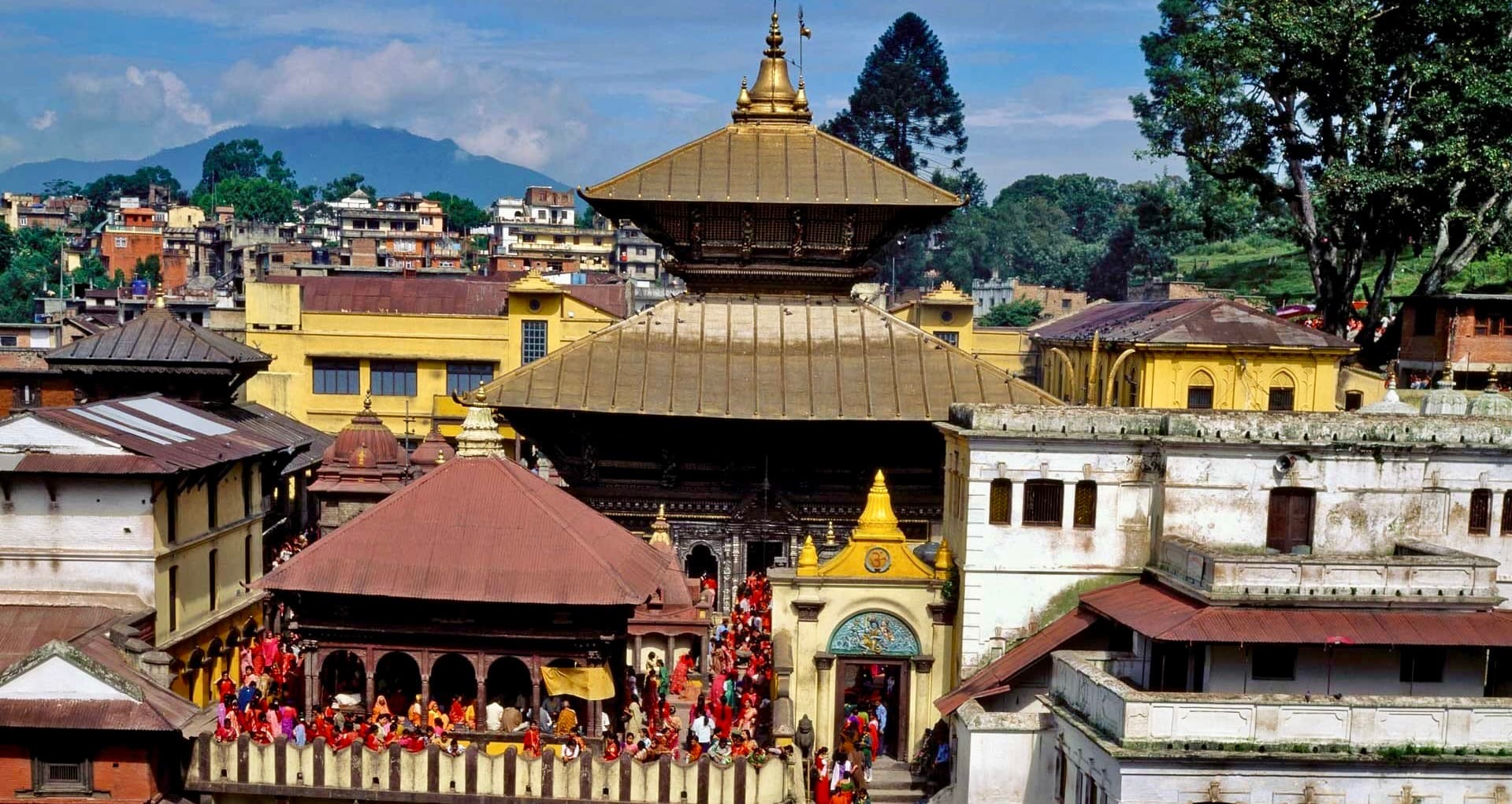







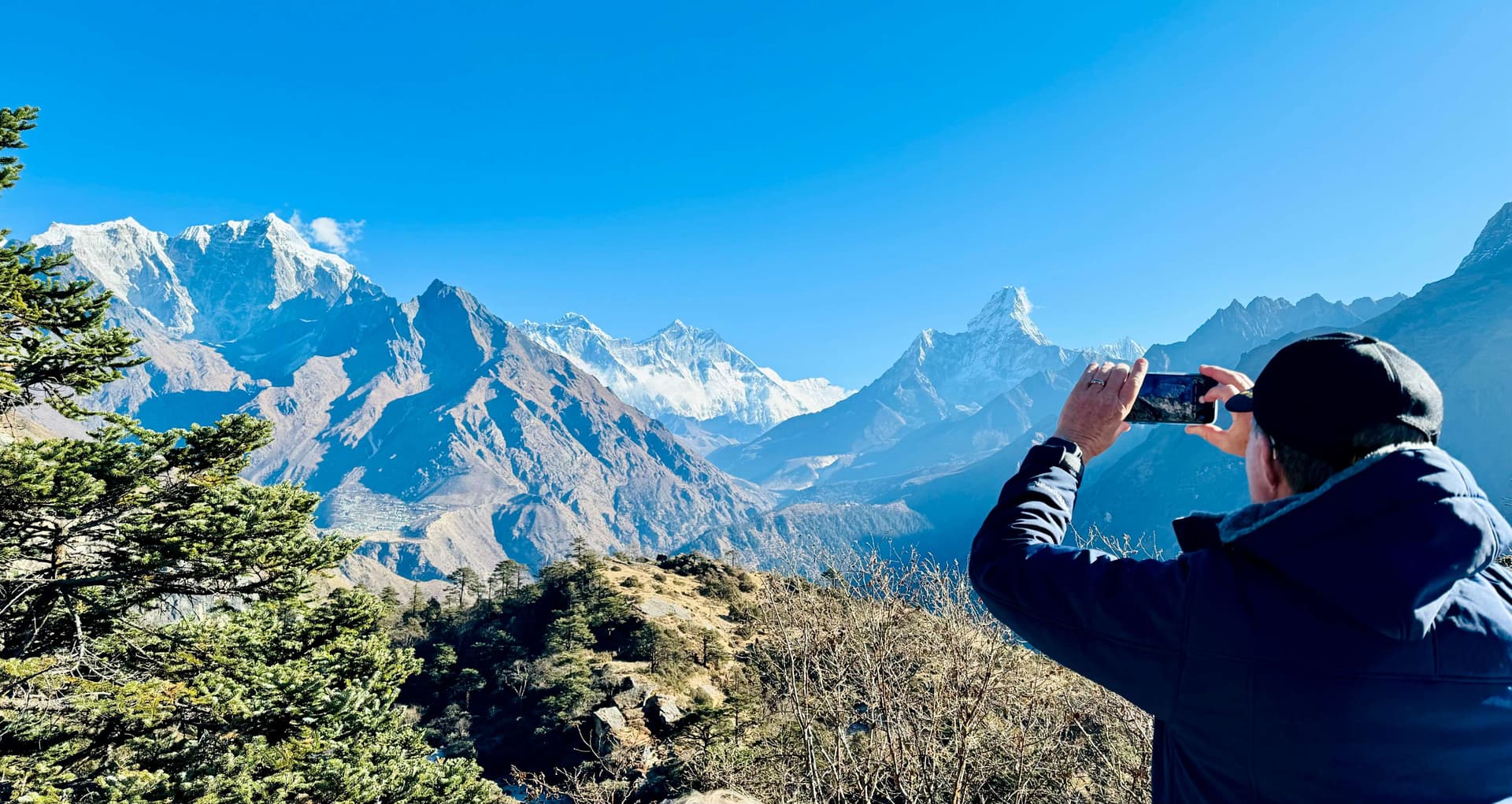


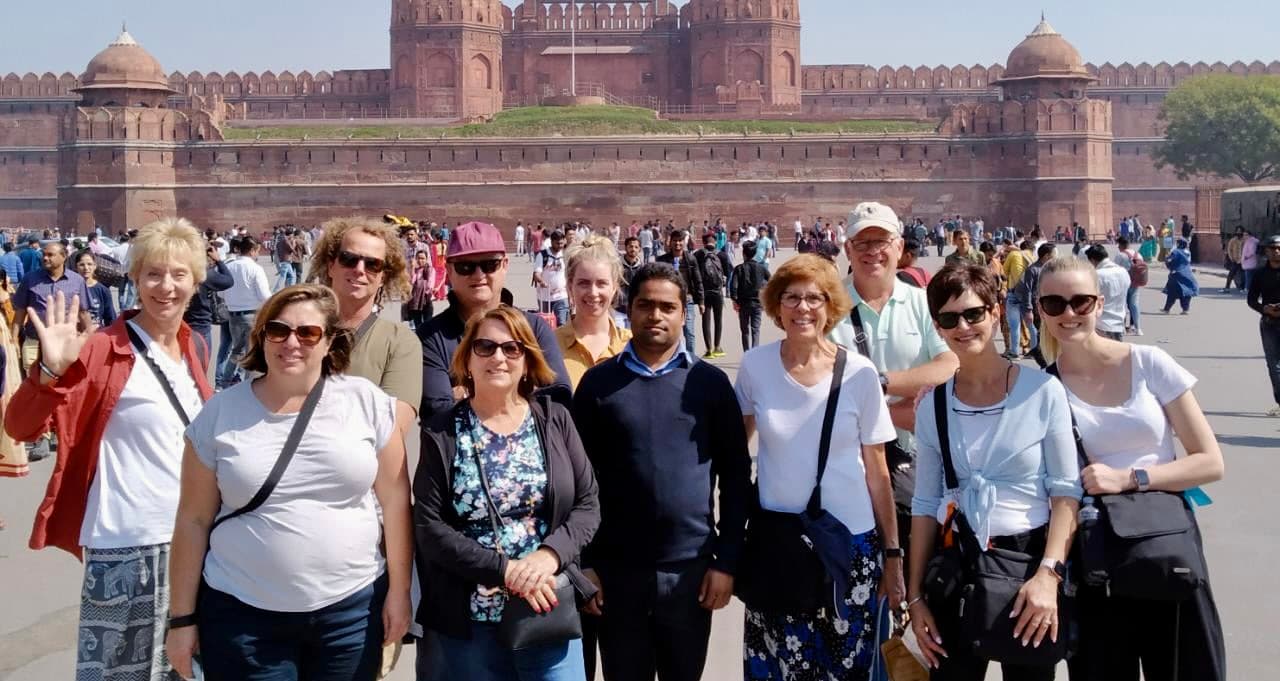
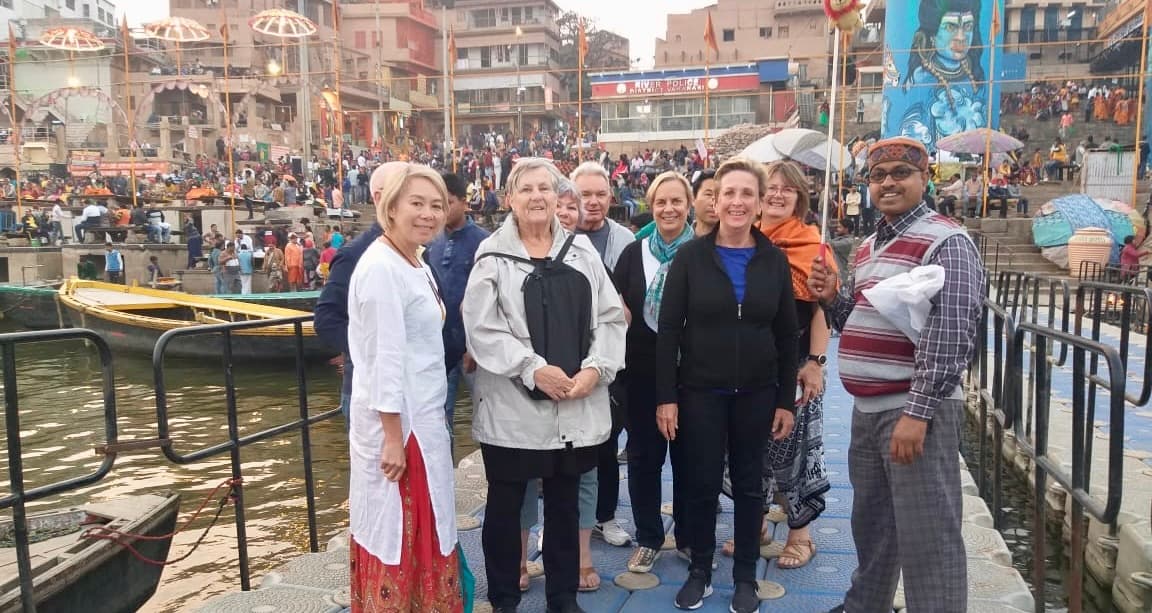
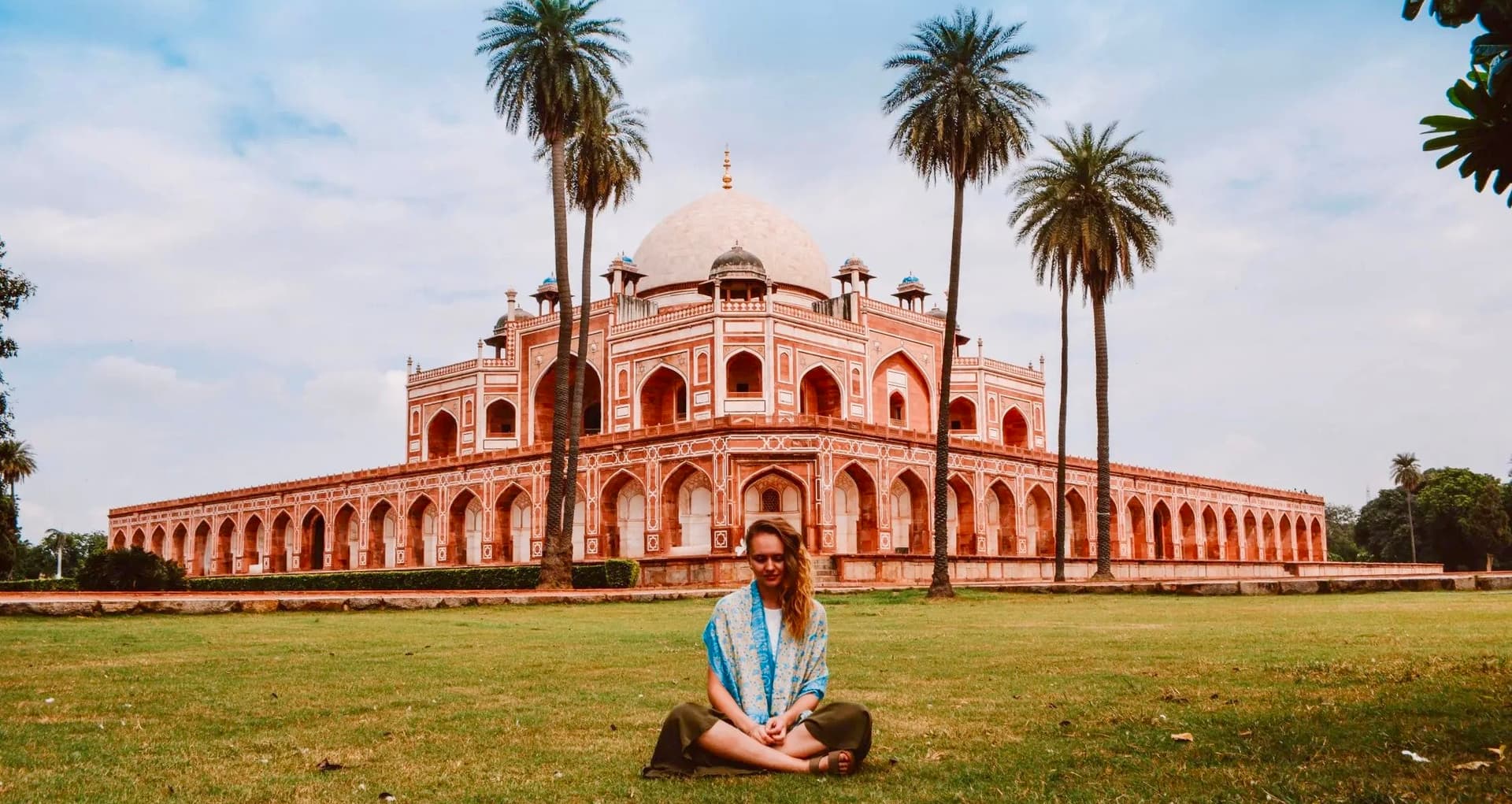
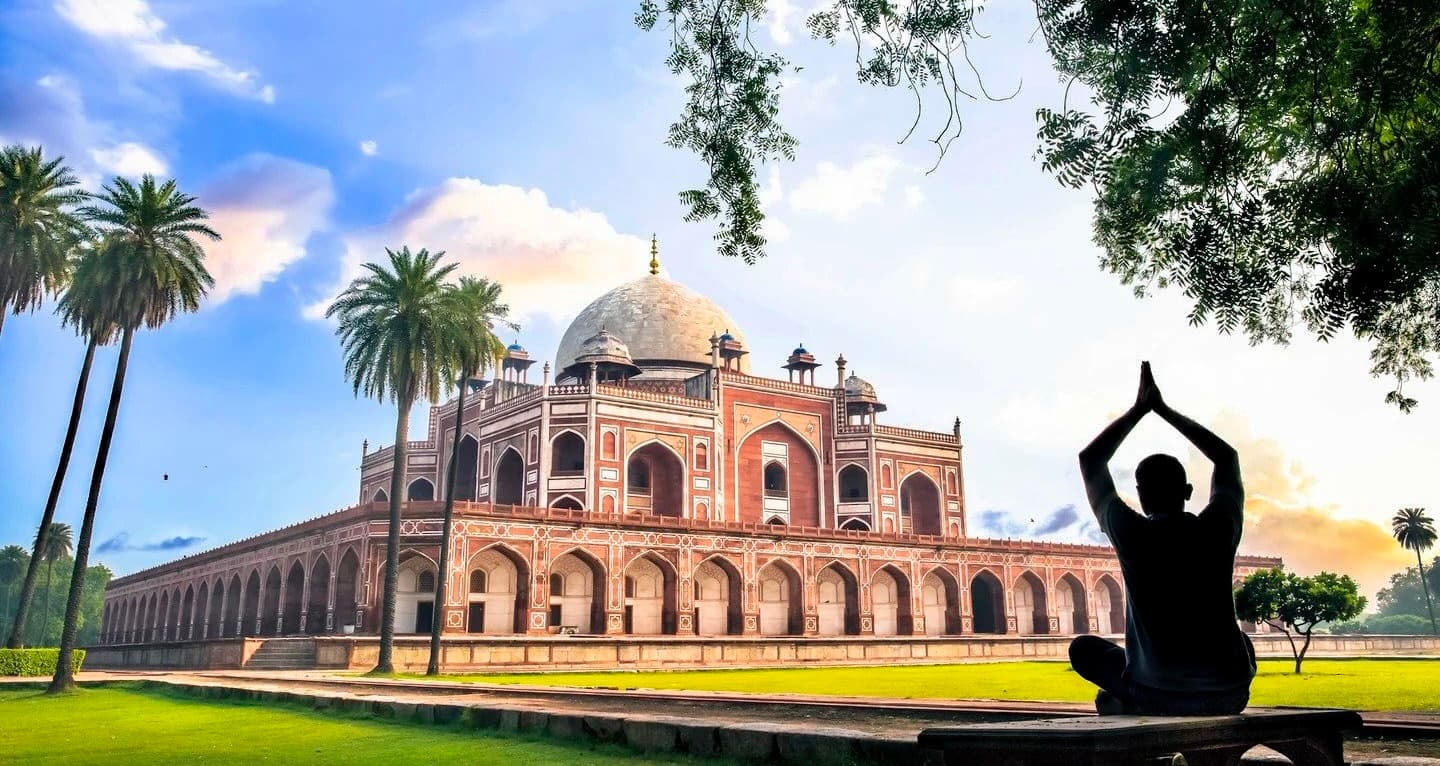


.jpeg&w=1920&q=75)
.jpeg&w=1920&q=75)